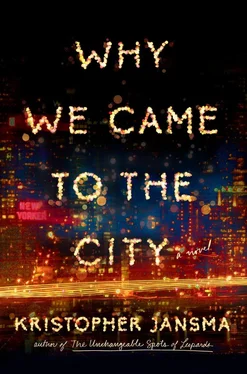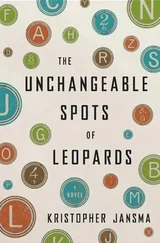Sara’s apartment, all the way across the island on York Avenue, was vastly superior. The railroad style wasn’t all that convenient for living with Karen, a former coworker whose boyfriend, Troy, now spent every night and most of every weekend there. But it would be perfect for her and George, if Karen could be convinced it was high time she moved out to Westchester, where she and Troy both worked now anyway.
The waiter was circling Sara like a shark now, trying to get her to give up the table. He was new and didn’t know that she was there practically all the time. He kept asking if perhaps she’d like to wait at the bar until her friend arrived. Sara pretended to take important calls from the office when he approached, her thoughts flitting to The Death of Eurydice . Some artsy friends of Irene’s were in it and had given them all tickets. But now Irene was saying she was too busy, and George couldn’t make it, and Jacob flat-out said he could make it if he’d wanted to but didn’t want to. Rude. Well, William had already written back to say he’d be delighted to come, and Sara could hardly wait to see him. She hoped he might inject a bit of civility into the group.
Sara came out of her reverie to find the waiter hovering again. She coughed and ordered another coffee, though she was jittery enough from the first two cups. It was strange being there alone. Since they’d come to the city, this had been where they’d all gathered by default for brunches, lunch breaks, and late-night bull sessions. They’d last been there a week ago, though actually — no, they hadn’t all been there. Jacob hadn’t been able to make it. And it had been trouble, as it always was, when one of them was missing. Whenever all of them were anywhere together — picnics down at the Battery, visits to see a new exhibit of Edwardian Court costumes at the Met, an investigatory meal at a new restaurant — no one said a cross word. If anyone did (most often Jacob), it was seen as genuinely good-natured… However, whenever someone was missing, that person almost instantly became the subject of speculation, criticism, and suspicion. It was as if the person’s absence left a hole in their mutual fabric, and the others couldn’t help but pull at the fraying threads around the hole, as if to say Something ought to be here. How has this happened?
Just last week they’d been right here in Bistro 19, without Jacob, because he was out on a date with a new boy. Isn’t he still secretly dating his boss? Irene wanted to know, even though his arrangement with the boss had been open from the get-go and they all knew it. Then George had started calling the new boy “Siddhartha,” because Jacob had mentioned that he lived this, like, monastic lifestyle, though not for religious reasons but just because he was sort of OCD about clutter and — here was the worst part — were they ready? They’d met at a coffee shop when Jacob had seen him finish reading a copy of Angela’s Ashes , get up, wipe down his table, clear his cup, and then throw the book in the trash can.
Irene couldn’t believe it. What George wanted to know was, had Jacob seen the Siddhartha guy’s place yet, and was it, like, completely spotless? Sara hadn’t been able to help herself from asking if Siddhartha had seen Jacob’s place yet, and Irene and George had almost lost it. None of them, not once in six years, had seen Jacob’s apartment. It was somewhere way up in East Harlem, and as far as they could tell, he never stayed there. Either he slept with a current or past boyfriend, or he stayed up in Stamford with his boss and took the train in as if nothing were at all strange. But it was strange. For one thing, he wouldn’t tell any of them where the apartment actually was. Sara thought it was because he’d bitten off more than he could chew in terms of the neighborhood, all blustery and believing that he could fit right in, only to find, as she’d explicitly told him a hundred times, that he didn’t feel safe, but of course he couldn’t admit that, and kept renewing the lease just to make the point.
She checked her phone again. Still no message from Irene. She texted Jacob to see if he’d heard from her. She texted Irene a question mark. She texted George a smiley face and admitted to herself, then and there, that of course she’d move in with him in a heartbeat — even into that tiny closet-toilet apartment. She’d live with him in a refrigerator box, in a nursery rhyme shoe, a teepee, an igloo, or a fortress made of couch cushions. Let the doubters doubt. Let the future be unsure. In a city of eight million, they’d always be two, together, and that was the beginning and the end of it. Then, just as she was about to get up and head back to the office, Irene rushed into the restaurant, her hands up high in breathless apology.
3
Jacob lay in bed with a poem wadded up inside his mouth. A dry, papery obstruction. The toxic stinging of ink along the ridge of his tongue. He reached in with two fingers and tried to pull it out, even as his throat, in some sort of horrible reverse gag reflex, tried to contract and swallow the poem whole. Just as his fingers hooked onto one pulpy piece of it, he felt his esophagus swell and take the whole thing in like Jonah’s whale. He pulled, gagging, on the edge of the paper, but it ripped, leaving just a scrap pressed between his fingers. His nightmare ended with a gasping breath, the poem ingested again— again! every fucking night! — and his bleary eyes staring down at the ripped fragment of paper he’d torn free. On it was the first line, in handwriting so messy he couldn’t read it.
And then he’d woken up, and that too, had vanished.
It took him a moment to be sure he wasn’t really choking. He could still feel the lump in his throat. As he got his breath back, he tried to think of where he was. Pete’s apartment , he thought, when he saw Pete snoozing on the right edge of the mattress. He worked from home on Tuesdays and Fridays. Which means that I am in Morningside Heights. Again.
Moving softly so as not to wake the slumbering Pete, Jacob found his pants on the floor, next to the copy of Breakfast at Tiffany’s that Pete was still finishing. What was it, like a hundred pages? He squeezed himself out of bed and slipped into the bathroom with the blue jeans, button-down Oxford, and brown tweed sports jacket he had worn the night before. He looked out the window at the white light of early afternoon. He remembered he had a night shift up at Anchorage House.
He closed his eyes and tried to see the words from his dream. It was there somewhere; he could hear its footsteps just around the corners of his head. Impulsively, he grabbed his cell phone and texted Dr. Boujedra. Oliver — Under the weather. Won’t make it up tonight. It was a message he sent at least once a week. One of the perks of his relationship with his boss was that he could usually get away with playing hooky when inspiration seemed about to strike — or even on days when he just couldn’t handle spending eight hours in the presence of hallucinating, drug-withdrawn, suicidal teenagers.
Back in Pete’s bedroom, Jacob picked up the Capote. It was the only book in the apartment — practically the only thing in the apartment. Pete owned one pot, one frying pan, one plate and one cup and one fork, a tacky lamp made out of conch shells, the mattress he slept on, one set of sheets — sky blue, with white puffy clouds — a yellow towel, and a cardboard box that contained his three outfits. One dressy, one for loafing around, and one to wear while washing the other two. He had a refrigerator and a stove, only because they’d come with the place, and both were always empty. His apartment was really quite large for a Manhattan studio, and Pete made good money working at Eco-Finance Apps or iPod Banking or something like that. He didn’t belong to any cult or ascetic belief system that Jacob could discern.
Читать дальше












